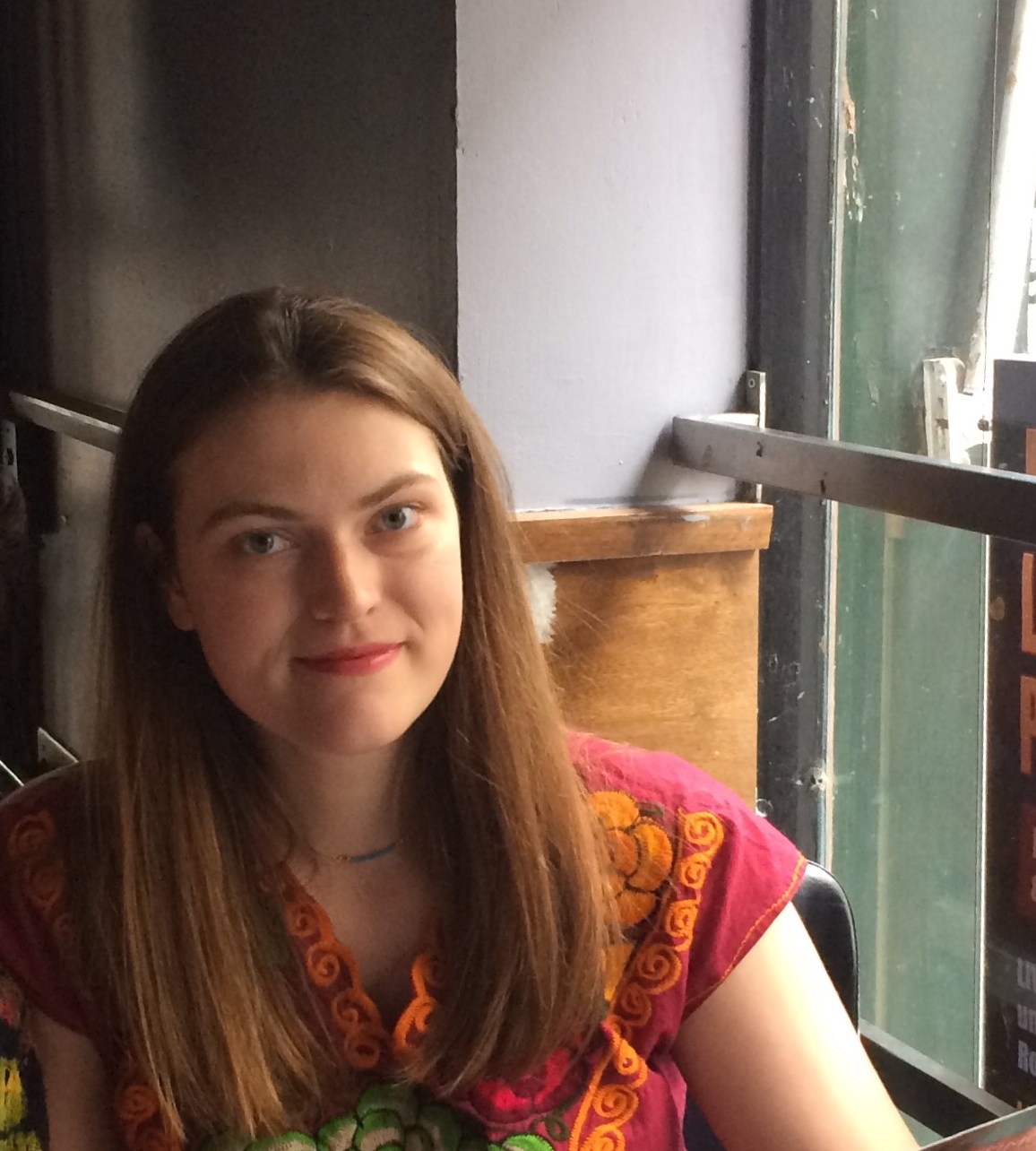There Were Three
Jennifer Carr
The children’s faces were all angles and curves that shifted and turned, never facing straight ahead for more than a few seconds. Ten, twenty of them, then thirty, pulsed together, the sun behind them so that only the more prominent features could be ascertained.
“Is she one? Over there?” Estella pulled the elbow of Amit’s jacket.
And already the face was exchanged with that of an older boy, about eleven years old. Another pulse, blue-eyed girl there now, and no, the eyes wouldn’t be blue on her, on any of them. That recessive gene didn’t float between Estella and Amit, and the new face in front of them was not their daughter’s.
~
Amit pulled the sheet off his wife’s sleeping body and watched the amber all over her skin in the small light that came through the shutters. He touched the skin of her hip, which was visible between her cotton T-shirt and underwear. The soft flesh that covered the rounded bone gave slightly under the pressure and raised goose bumps. Estella awoke and without looking at her husband, turned to the clock.
“I’ll make the coffee,” she said, getting out of the bed and reaching for a pair of sweats. Amit watched her shadow bend into the kitchen, listening for her sounds as she spooned the grounds into the metal cup, poured the water, and lit the stove. He went into the bathroom, into the drawer that now exclusively held the phials and syringes, though supplies were running low. He’d bring home another carton of syringes when he finished his shift.
In the kitchen, Estella was wiping the drip from the cup on the hem of her shirt, and Amit inspected his wife, looking at the slope of her shoulders under the thin cotton.
“You ready?” He tapped the side of the syringe. Estella lifted her shirt while Amit slid her sweatpants and underwear down her hip, pinching the flesh he had touched earlier. Estella stared at the cups on the stove while her husband pushed in the needle.
“I don’t know why we keep doing this,” Estella said. “It didn’t work the first fifty-seven thousand times.”
Amit wiped at her skin with the back of his hand. “How do you feel?”
“I don’t know,” his wife said. “Fine. The same.”
While Amit slid into his slacks and buttoned his shirt, he watched Estella staring at the unmade bed. The wrinkled sheets still revealed the outline of his form, but on her side, the sheets were smooth and vacant, as though she hadn’t spent the night alongside him. But he knew better. The two of them were always together, always just two.
When Amit returned from work, he summarized the day’s patients, the diagnoses rote, but he recited their stories because during the day he had answers. He had cures and solutions. He cleared the table while his wife washed the few dishes, lit the stove for the tea.
“Why don’t you go relax on the couch, and I’ll bring in the tea when it’s ready.”
Estella wiped her hands on the towel and gave her husband a kiss on the shoulder as she passed out of the room. While the water boiled, Amit took the canister from the back of the cabinet, where they kept it hidden behind the flour. There were only two roots left, twisted and tar-black. He took one, rubbed it between his fingers, and broke it in half, one for each cup. He’d been warned back in Rajapur that these would be all he could have, that the doses were exact.
He sat next to Estella, and she squeezed herself against his shoulder, pulling her legs across his lap. Their casual physical contact had tapered to a few lean moments stretched through the week, except for the ritual once they got into bed. It was important, Amit had been told, to never let go of Estella at that point. Now, Estella pressed harder into his chest as if to search for the longing they had once felt for each other, if only so that they could store up the feeling of the other’s body for tomorrow.
“How much can you remember?” Amit asked.
“Only fuzzy images. I know the pictures are there, but they never get clear.” Estella took a few sips of her tea. Amit was almost finished with his. “How many do we have left?” she asked.
Amit didn’t want to tell his wife, so he said, “Plenty.” He hoped two would be enough, that they wouldn’t even need the last one. Every night, he told himself this would be the night. This would be the night they would find them.
“More than two?” Estella asked, leaning all the way back on the couch with her legs across Amit’s lap while he stroked her knees. She held her cup of tea on her stomach.
“Don’t spill any,” Amit told her.
“And when it’s finished,” Estella said, “then I go back—”
“Don’t say finished.”
“And when it’s finished, then I go back to work and stop being an invalid and we’ll be okay.”
Amit licked the last drips from the inside of his cup. “I don’t like you going back to all those chemicals. Maybe that was the problem.”
“Now you sound paranoid.” Estella gulped her last. “I make the drugs, you prescribe them, we save everyone else but our—”
“Don’t say it.” There was still time, still two nights.
She didn’t change her position. “What I remember,” she began, “is that I am never surprised. Once I see them. I remember feeling unsure until it’s actually one of them, and that’s when I know. The eyes are always dark, with your strong brow.”
“Yes,” Amit said, “That’s what I think for me too. And the oldest one stands the way you do, shoulders square and head titled a little to the side.”
“And has a cleft in his chin like yours,” Estella said.
“The girl has bony knees and thick hair.”
“And the younger boy’s hair curls, more than the older two. And as he grows, he’ll try to be like his older brother.”
“He will always try,” Amit said.
Estella set the cups back on the table, and Amit pulled her back against his chest.
“Do you feel it yet?” he asked.
“I’m ready.”
They rushed through their teeth brushing and took off their clothes, climbing into the cold sheets. Amit kissed his wife’s neck and pressed himself against her back, making sure the entire length of his body touched hers, so that there was no chance of separation. Estella felt for his hand and clasped it, squeezing her smaller knuckles between his. She slid the woolen manacle over their wrists and cinched. They both closed their eyes and waited for sleep.
~
The gray was so thick in the sky it seeped down the sides of the buildings, pooling in the street gutters. Amit and Estella clasped hands below the manacle, and as they walked the sidewalk, he could feel her try to match the clicks of his heels, though she had to take bigger, quicker steps. Amit didn’t want to slow his pace. He kept alert for any sound.
A breeze started, and Amit watched the way Estella’s skirt blew between her legs when she walked. He wanted to put his arm around her shoulders because of the chill, but instead he said, “We’d better walk quicker. We have a lot of street to cover.”
Amit and Estella heard them first, not the voices but the collective movement, because the sounds of the shoes slapping at the pavement were carried through the labyrinth of buildings and down the long streets, and the sounds split off and ran the intersecting lines of street and buildings so that Amit and Estella turned themselves in circles to chase the origin.
“It’s down this way.” Estella lifted their hands to point to her right.
“No, I think they’re coming from behind us.”
“Are they moving toward us or away from us?”
Amit listened, tried to follow each trail of hollow clapping that raced around them, lurching forward and snapping back against Estella, who, rigid, watched the opposite direction. Her knuckles, white and damp, slid through Amit’s fingers so that he had to snatch them up again, it was time to move, Amit could feel the rumble of the ground as the footsteps became more distinct, separate earthquakes within a large mass.
Amit vice-clamped her hand and said back to her, “Run.”
He felt Estella’s shoulder pop as he pulled her, and he pulled her again, to the side of the street, and he pressed her against the building.
The children were quiet except for their shoes and the faint sound of their clothing rubbing together as they ran. This was the largest group that Amit and Estella had seen, and when the herd rounded the corner of the preceding cross street, the force of their energy blew Estella into her husband, knocking his head into the wall. None of the children looked at the couple as they ran past them, the younger ones tripping a little, held up by the older ones, the youngest ones being carried, the infants too young to be in the herd.
“We have to follow them,” Estella yelled.
“We have to wait until they all pass.”
“I can’t get a good look at their faces. We have to go.” Estella tried to run into the street, into the mass of movement, but as she stepped out, she was knocked aside by one who was about fifteen, one who had been lost for a long time, whose parents had never collected him or maybe who, like Amit and Estella, were still trying to find him. Amit’s attached arm bent at a dangerous angle.
“Jesus,” Amit said, pulling his wife back against the stone wall. Once the last of the herd passed, they joined with the stragglers in the back, checking the faces around them, looking past the recessive fair traits for the ones to zero in on.
Estella’s legs were heavy and Amit’s lungs burned, yet the children still ran, the older ones sometimes handing off the youngest ones to another for a reprieve, smooth and efficient as though it were a rehearsed routine. In one fluid motion, a toddler would move from the hands of one into the arms of another who had been running parallel. Amit hauled Estella along with him, so that her legs seemed to float off the ground, kicking the air. But the children never slowed.
He wanted to be like the children, to put one leg in front of the other in the unconscious way the heart beats blood, the compression of ventricles, the release, the push, muscles tightening, the extension, the propulsion, the most fluid machine, mechanical releases, to run, to run. Amit tried to leap in step with them, to expand his stride, minimize the impact against the ground, for a moment forgetting about Estella, tethered to him.
“Amit, wait, I can’t—” The slack between their arms tightened. The children pulled farther away.
“We’re losing them.”
“I can’t. I’m sorry.”
Amit slowed, Estella collapsed against him, and he watched the children until they were small silhouettes and, finally, a mass of dots almost a mile away. Estella’s body quivered and her splintered tears stuck on Amit’s wool sweater.
Amit cupped the back of her head as she tilted against him, keeping his hold of her hand down by his hip as the last of the footbeats died away.
~
Amit woke up clinging to Estella, their bodies damp and reeking a sickly sweet that oozed from their skin like tar. Estella whimpered but her eyes stayed closed as Amit unstrapped the manacle. He wasn’t sure if she was awake or still somewhere else.
“Estella, Estella.” He held her face and kissed her head, “Wake up. Are you all right?”
Estella opened her eyes and nodded. Amit kissed her, all the way down her neck and shoulders until she slid her arms around his back, he pulled off the rest of their clothes, and she wrapped her legs around his waist and took him in.
It had to be as simple as giving themselves more time, Amit thought as he walked to the dispensary. On his patient’s file, a simple gall bladder procedure, he wrote in a dose of Lorazepam, took the phial from the cabinet, and dropped it into his coat pocket. When he got a chance later on, he would transfer the phial to his jacket back in his locker, but he had to finish his rounds first.
In Rajapur, he had sat with the old mantrik, cross-legged on the straw mat in the back of his home, a woven hut on the sweltering bank of the Yamuna River. He was a friend of Amit’s grandmother, who had insisted Amit visit him. The rest of the family thought she was crazy and that the mantrik was a charlatan. But Estella was still willing to try, still believed in Amit when he got in his father’s car and drove out to meet Bhishma. While Estella waited back in Mumbai with Amit’s family, he sat for three days ingesting only leaves and the odor of incense, shaking in and out of consciousness, retching from heat and near dehydration, while Bhishma waited for the toxins to leave Amit’s body. When the squeezing inside him stopped, Amit saw the flash of three faces, two boys and a girl, already old enough to run. “You must hurry,” Bhishma told Amit. “You’re running out of time.” Even then, they were running out of time.
Amit wouldn’t mention to Estella about the sedative. She complained it was useless that he was even still injecting her with hormones, but Amit believed in redundancies, and besides, Bhishma hadn’t warned against continuing with them. After dinner, Amit opened the blue aluminum container, feeling the last whole root rattle around the tin before splitting it with one hand. He held the two smaller pieces in his palm, using his forefinger to warm the skin before he dropped them into the water. While they steeped, he went to the living room to retrieve his jacket folded on the back of the chair and pulled out the glass phial.
All creatures have an expiration date and have to be found before that date, Bhishma told him. For some people, it is very easy. Most don’t even know they are looking for them. For others, it’s not so easy. Some children are stubborn. But there is an allotment, and always an order. Amit had to get the first child before the others. No first child, no hope for the others. Bhishma had formed three small shapes with mud and Amit’s urine, then took the sal leaves on which he’d written his charms and stuffed them around the acrid shapes, making Amit bend over them, the smell of his own waste burning his eyes. “Sometimes, the children do not want to come at all.” After three more hours of mediation, Bhishma handed Amit a parcel, thick and sticky roots wrapped in a sleeve of purple leaves. “For you, only sixteen, no more. The rest will be wasted.”
“Just bring the tea in here,” Estella called from the bedroom.
Amit filled a syringe with the sedative, then followed Estella’s voice. “Here you go,” he said.
“What is that?” Estella asked, sitting up in the bed.
“This one goes in the shoulder. It’ll help.”
Estella lay back, letting her arm go limp so Amit could squeeze the soft muscle. “I thought you could lie with me for a while, we could talk first.”
“I just have to go back to get my cup,” Amit said.
“Have you ever,” Estella began. “I was wondering, what would you be willing to give up to get them? Even just one?”
Amit stood in the doorway, frozen by Estella’s otherworldly gaze. “I don’t believe in those bargains. We’ve seen them. They aren’t hypothetical.” He couldn’t look at her, not directly. “Drink up, and I’ll be right back.”
He sipped his tea and capped the syringe, tossing it out. The children might be stubborn but he was more stubborn. You couldn’t see your children and not have them, not have them all. What could he and Estella bargain? He gave himself a shot in the glute and could feel the fatigue set into his limbs, the hazy weight of the medication as his heart pumped it through his bloodstream. He ran back to the bedroom, where Estella was already dozing. “Don’t fall asleep,” he said, “not yet.”
“I’m here, I’m here,” Estella said, holding out her arm. Amit was clumsy. He could feel himself being pulled under as he climbed next to her, and Estella moved only slightly to adjust to the movement on the mattress. He cradled Estella into his body and slid the band over their hands and cinched his arm to hers.
~
They were in the middle of an intersection, though none of the streets was marked with signs or signals. There was a pale glow to the right, where it must be the sun behind the clouds in its perpetual evening, so he said they should move north, remembering something important in that direction. Estella didn’t speak but followed him as he counted steps to the first intersection before drifting into an unfamiliar constellation of buildings where the streets twisted and narrowed and intersected at acute angles. From somewhere down an alley, Amit heard a door shut, and taking the first turn, he was sure there were footsteps, the shallow steps of children, that he was chasing.
After what might have been a few minutes, he saw three bodies duck into a façade that anywhere else might have marked an old hotel. He didn’t think the older children had seen them—they were teenagers, almost—but he couldn’t risk them getting away, protected in one of the lairs. That was when the first earthquake hit.
It was enough to rattle the windows, breaking the thin glass in the larger panes. The shaking was over quickly, and at home, Amit would have gone about the rest of his day without afterthought. But the children didn’t seem to know about earthquakes, at least not the ones who ran down the steps across the street, ran into the middle of the street, and looked first up at the buildings, then down the road. Amit was then spotted by the whole group while he leaned against the stone wall. As one, the children fled north and out of view despite Amit’s long stride. But there were others now, children startled by the shaking, and they emptied the buildings, waiting for someone who could explain to them what was happening. And there, with his fists clenched and jaw set, the heavy brow furrowed, stood Amit’s oldest son, almost a young man now, the younger children gathered around him and waiting for the next move.
Amit tried to remember his son’s name, but the sounds wouldn’t form behind his teeth, and when Amit opened his mouth to call out, he felt as if his teeth were about to drop out of his gums, that he had to hold his hand to his face. Once he was sure his teeth were secure, he tried again, parted his lips, and a second time, the bone loosened in his jaw and his teeth slipped sideways in their spaces. His son moved his younger siblings through the herd and was leading them up the street. “Come on,” he heard Estella say, but he couldn’t reply, he wanted to tie his jaw shut. Estella pulled them, and he tried to speak, to tell her to call out the name. But she was ahead of him, Amit saw Estella’s back, they were untethered and she was going, following after their children. Their son had been only thirty or so meters ahead of them, but the head start was ruthless, and every time Amit’s feet pounded against the concrete, he was sure he felt another tooth drop past his chin. But now that he was running, he couldn’t stop, he couldn’t let his son get away from him, he kept the back of that dark head in sight until the herd turned down the next block.
By the time Amit reached the street where they had turned, the children were in full view, the entire pack in the middle of the street. And then he felt as if something had fallen from his pockets or his chest, his body or the ground trembled, and he realized he couldn’t see Estella. He felt himself dissolving as he watched the backs of the children get smaller, dimmer, and they were almost to the next block, but Estella was not among them. The fastest of the group were now rounding the next corner, and Amit could make out his son before he too disappeared. He took one more step forward, one last step toward his son. Let me find Estella, he said, and he closed his eyes and sniffed the air, not sure what he would be able to detect, but he turned and stumbled back in the direction he’d come, and in a few more turns, there she was on the stoop of one of the buildings, holding threadbare wool sweaters, several of them, clumped on her lap. When he caught up to her and reached for her hand, he saw that it was covered in blood and black dust, that her hair was caked with a sticky mess of blood and rubble, and the last thing he heard her say was, “The beds were empty, the sweaters too, as if they evaporated when I got there.”
~
Estella awoke first, hugging the edge of the bed. Amit was on his back, his hand over his eyes. She wanted coffee and thought how nice it would be for Amit to smell the deep thick smell from inside his dream, maybe to follow it home. She tried to think back into her sleep, remember a fragment, but what she saw was Amit, holding her. When she went to the bathroom, she saw the blood that had spread across her underwear. Estella wiped the spot, then slid the underwear over her ankles and washed them with cold water in the sink. She went to the bedroom to get a new pair and put on her sweats, watching Amit as he slept, while he dreamt of running even until the last of him had gone.






